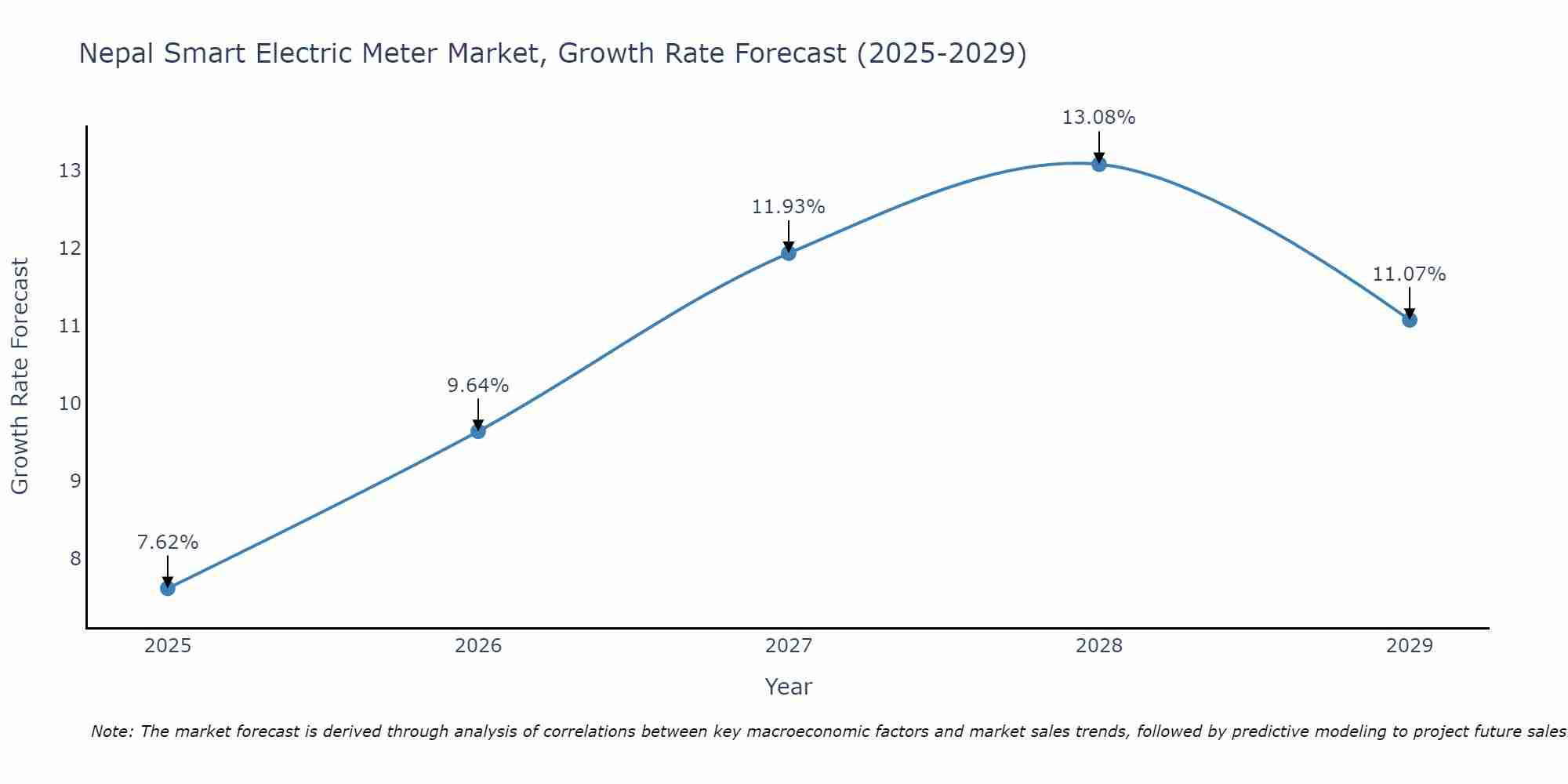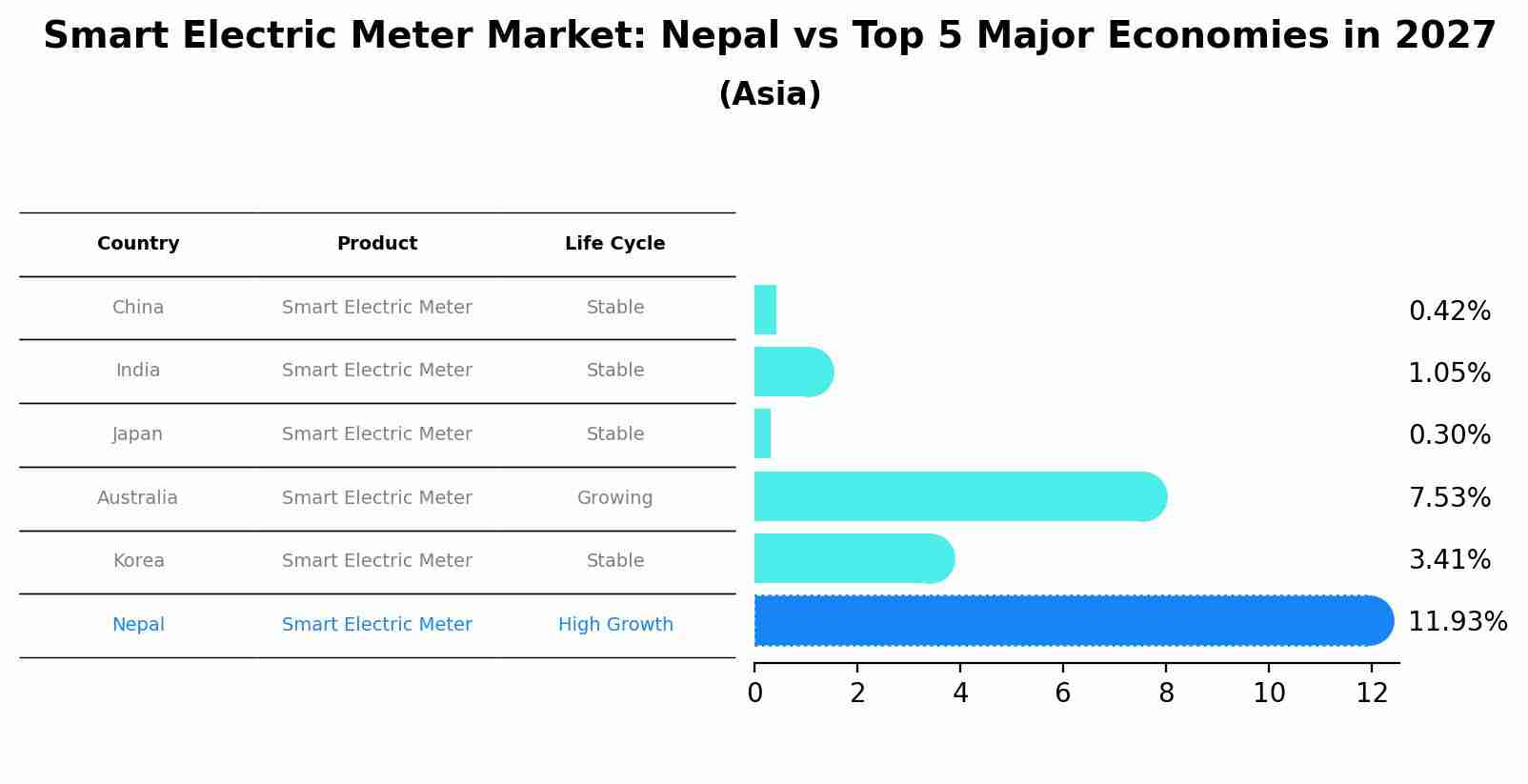Nepal Smart Electric Meter Market (2025-2031) Outlook | Industry, Analysis, Forecast, Share, Trends, Value, Revenue, Growth, Companies, Size
| Product Code: ETC369336 | Publication Date: Aug 2022 | Updated Date: Jul 2025 | Product Type: Market Research Report | |
| Publisher: 6Wresearch | Author: Dhaval Chaurasia | No. of Pages: 75 | No. of Figures: 35 | No. of Tables: 20 |
Nepal Smart Electric Meter Market Size Growth Rate
The Nepal Smart Electric Meter Market is projected to witness mixed growth rate patterns during 2025 to 2029. Starting at 7.62% in 2025, the market peaks at 13.08% in 2028, and settles at 11.07% by 2029.

Smart Electric Meter Market: Nepal vs Top 5 Major Economies in 2027 (Asia)
The Smart Electric Meter market in Nepal is projected to grow at a high growth rate of 11.93% by 2027, highlighting the country's increasing focus on advanced technologies within the Asia region, where China holds the dominant position, followed closely by India, Japan, Australia and South Korea, shaping overall regional demand.

Nepal Smart Electric Meter Market Synopsis
The Nepal Smart Electric Meter Market is experiencing steady growth driven by increasing awareness of energy efficiency and government initiatives promoting smart grid infrastructure. Smart meters enable real-time monitoring of energy consumption, accurate billing, and integration of renewable energy sources. Key players in the market include Landis+Gyr, Itron Inc., and Honeywell International Inc. Factors such as rising urbanization, infrastructure development, and the need for reliable electricity supply are fueling the demand for smart electric meters in Nepal. However, challenges such as high initial costs, interoperability issues, and data privacy concerns hinder market growth. Despite these challenges, the market is expected to expand further as utilities and consumers recognize the benefits of smart meter technology in optimizing energy usage and reducing operational costs.
Nepal Smart Electric Meter Market Trends
The Nepal Smart Electric Meter Market is experiencing significant growth driven by increasing government initiatives towards modernizing the electricity distribution infrastructure and promoting energy efficiency. The adoption of smart meters in Nepal is rising due to their ability to provide real-time data on energy consumption, enabling consumers to monitor and manage their electricity usage more effectively. The market is also witnessing a shift towards smart grid technologies, which further boosts the demand for smart electric meters. Key players in the market are focusing on developing advanced metering solutions with features such as remote monitoring, automated billing, and integration with smart home systems. Overall, the Nepal Smart Electric Meter Market is expected to continue expanding as utilities and consumers recognize the benefits of smart metering technologies.
Nepal Smart Electric Meter Market Challenges
In the Nepal Smart Electric Meter Market, several challenges are faced including infrastructure limitations, such as inadequate internet connectivity and power supply disruptions, which hinder the effective implementation and operation of smart meters. Additionally, the high initial investment cost for deploying smart meters can be a barrier for both utility companies and consumers. Lack of awareness and understanding among consumers about the benefits of smart meters also poses a challenge in adoption rates. Furthermore, regulatory frameworks and policies need to be updated and streamlined to support the integration of smart meters into the existing electricity grid system. Overall, addressing these challenges will be crucial in driving the growth and success of the Nepal Smart Electric Meter Market.
Nepal Smart Electric Meter Market Investment Opportunities
The Nepal Smart Electric Meter Market presents promising investment opportunities due to the growing demand for efficient energy management solutions in the country. With increasing urbanization and industrialization, there is a need for reliable and accurate measurement of electricity consumption. Investing in smart electric meters in Nepal can offer significant returns as utilities and consumers seek to optimize energy usage, reduce costs, and enhance overall grid efficiency. The government`s initiatives to modernize the electricity infrastructure and improve energy access further support the market growth. Potential investors can explore partnerships with local utilities, manufacturers, and technology providers to tap into this emerging market and capitalize on the increasing adoption of smart grid technologies in Nepal.
Jordan Agar Market Government Policies
The government of Nepal has implemented policies aimed at promoting the adoption of smart electric meters in the country. These policies include the Smart Metering Implementation Plan, which outlines the gradual replacement of traditional electric meters with smart meters to improve efficiency and accuracy in electricity consumption monitoring. Additionally, the government has introduced incentives such as subsidies and rebates to encourage utilities and consumers to invest in smart meter technology. Furthermore, regulations have been put in place to ensure data privacy and security for smart meter users. These government initiatives are expected to drive the growth of the smart electric meter market in Nepal and contribute to the modernization of the country`s energy infrastructure.
Nepal Smart Electric Meter Market Future Outlook
The future outlook for the Nepal Smart Electric Meter Market is promising, with significant growth expected in the coming years. Factors driving this growth include the government`s initiatives to modernize the energy infrastructure, increase energy efficiency, and reduce electricity theft. The adoption of smart electric meters is also being propelled by the rising awareness among consumers about the benefits of real-time monitoring, remote access, and energy conservation. Furthermore, the increasing focus on renewable energy sources and the need for a more sustainable energy system are likely to boost the demand for smart electric meters in Nepal. Overall, the market is forecasted to experience steady growth as utilities and consumers alike recognize the advantages of smart metering technology.
Key Highlights of the Report:
- Nepal Smart Electric Meter Market Outlook
- Market Size of Nepal Smart Electric Meter Market, 2024
- Forecast of Nepal Smart Electric Meter Market, 2031
- Historical Data and Forecast of Nepal Smart Electric Meter Revenues & Volume for the Period 2021 - 2031
- Nepal Smart Electric Meter Market Trend Evolution
- Nepal Smart Electric Meter Market Drivers and Challenges
- Nepal Smart Electric Meter Price Trends
- Nepal Smart Electric Meter Porter's Five Forces
- Nepal Smart Electric Meter Industry Life Cycle
- Historical Data and Forecast of Nepal Smart Electric Meter Market Revenues & Volume By Phase for the Period 2021 - 2031
- Historical Data and Forecast of Nepal Smart Electric Meter Market Revenues & Volume By Single for the Period 2021 - 2031
- Historical Data and Forecast of Nepal Smart Electric Meter Market Revenues & Volume By Three for the Period 2021 - 2031
- Historical Data and Forecast of Nepal Smart Electric Meter Market Revenues & Volume By Communication Technology Type for the Period 2021 - 2031
- Historical Data and Forecast of Nepal Smart Electric Meter Market Revenues & Volume By Power Line Communication (PLC) for the Period 2021 - 2031
- Historical Data and Forecast of Nepal Smart Electric Meter Market Revenues & Volume By Radio Frequency (RF) for the Period 2021 - 2031
- Historical Data and Forecast of Nepal Smart Electric Meter Market Revenues & Volume By Cellular for the Period 2021 - 2031
- Historical Data and Forecast of Nepal Smart Electric Meter Market Revenues & Volume By End-Users for the Period 2021 - 2031
- Historical Data and Forecast of Nepal Smart Electric Meter Market Revenues & Volume By Industrial for the Period 2021 - 2031
- Historical Data and Forecast of Nepal Smart Electric Meter Market Revenues & Volume By Commercial for the Period 2021 - 2031
- Historical Data and Forecast of Nepal Smart Electric Meter Market Revenues & Volume By Residential for the Period 2021 - 2031
- Nepal Smart Electric Meter Import Export Trade Statistics
- Market Opportunity Assessment By Phase
- Market Opportunity Assessment By Communication Technology Type
- Market Opportunity Assessment By End-Users
- Nepal Smart Electric Meter Top Companies Market Share
- Nepal Smart Electric Meter Competitive Benchmarking By Technical and Operational Parameters
- Nepal Smart Electric Meter Company Profiles
- Nepal Smart Electric Meter Key Strategic Recommendations
Frequently Asked Questions About the Market Study (FAQs):
- Single User License$ 1,995
- Department License$ 2,400
- Site License$ 3,120
- Global License$ 3,795
Search
Thought Leadership and Analyst Meet
Our Clients
Related Reports
- Canada Oil and Gas Market (2026-2032) | Share, Segmentation, Value, Industry, Trends, Forecast, Analysis, Size & Revenue, Growth, Competitive Landscape, Outlook, Companies
- Germany Breakfast Food Market (2026-2032) | Industry, Share, Growth, Size, Companies, Value, Analysis, Revenue, Trends, Forecast & Outlook
- Australia Briquette Market (2025-2031) | Growth, Size, Revenue, Forecast, Analysis, Trends, Value, Share, Industry & Companies
- Vietnam System Integrator Market (2025-2031) | Size, Companies, Analysis, Industry, Value, Forecast, Growth, Trends, Revenue & Share
- ASEAN and Thailand Brain Health Supplements Market (2025-2031) | Strategy, Consumer Insights, Analysis, Investment Trends, Opportunities, Growth, Size, Share, Industry, Revenue, Segments, Value, Segmentation, Supply, Forecast, Restraints, Outlook, Competition, Drivers, Trends, Demand, Pricing Analysis, Competitive, Strategic Insights, Companies, Challenges
- ASEAN Bearings Market (2025-2031) | Strategy, Consumer Insights, Analysis, Investment Trends, Opportunities, Growth, Size, Share, Industry, Revenue, Segments, Value, Segmentation, Supply, Forecast, Restraints, Outlook, Competition, Drivers, Trends, Demand, Pricing Analysis, Competitive, Strategic Insights, Companies, Challenges
- Europe Flooring Market (2025-2031) | Outlook, Share, Industry, Trends, Forecast, Companies, Revenue, Size, Analysis, Growth & Value
- Saudi Arabia Manlift Market (2025-2031) | Outlook, Size, Growth, Trends, Companies, Industry, Revenue, Value, Share, Forecast & Analysis
- Uganda Excavator, Crane, and Wheel Loaders Market (2025-2031) | Strategy, Consumer Insights, Analysis, Investment Trends, Opportunities, Growth, Size, Share, Industry, Revenue, Segments, Value, Segmentation, Supply, Forecast, Restraints, Outlook, Competition, Drivers, Trends, Demand, Pricing Analysis, Competitive, Strategic Insights, Companies, Challenges
- Rwanda Excavator, Crane, and Wheel Loaders Market (2025-2031) | Strategy, Consumer Insights, Analysis, Investment Trends, Opportunities, Growth, Size, Share, Industry, Revenue, Segments, Value, Segmentation, Supply, Forecast, Restraints, Outlook, Competition, Drivers, Trends, Demand, Pricing Analysis, Competitive, Strategic Insights, Companies, Challenges
Industry Events and Analyst Meet
Whitepaper
- Middle East & Africa Commercial Security Market Click here to view more.
- Middle East & Africa Fire Safety Systems & Equipment Market Click here to view more.
- GCC Drone Market Click here to view more.
- Middle East Lighting Fixture Market Click here to view more.
- GCC Physical & Perimeter Security Market Click here to view more.
6WResearch In News
- Doha a strategic location for EV manufacturing hub: IPA Qatar
- Demand for luxury TVs surging in the GCC, says Samsung
- Empowering Growth: The Thriving Journey of Bangladesh’s Cable Industry
- Demand for luxury TVs surging in the GCC, says Samsung
- Video call with a traditional healer? Once unthinkable, it’s now common in South Africa
- Intelligent Buildings To Smooth GCC’s Path To Net Zero


















